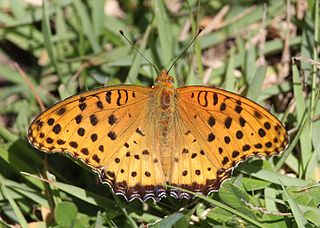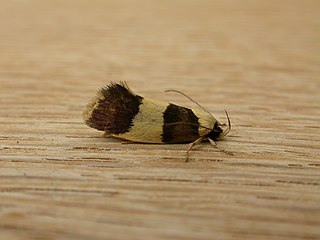
Charaxes durnfordi, the chestnut rajah, is a butterfly found in India that belongs to the rajahs and nawabs group, that is, the Charaxinae group of the brush-footed butterflies family.

Niphanda cymbia, the pointed Pierrot, is a small butterfly found in northern India, Burma and northern Borneo that belongs to the lycaenids or blues family.

Euchrysops cnejus, the gram blue, is a small butterfly that belongs to the lycaenids or blues family. It is found from India to Australia. The species was first described by Johan Christian Fabricius in 1798.

Orthomiella pontis, the straightwing blue, is a small butterfly found in India that belongs to the lycaenids or blues family.

Anthene emolus, the ciliate blue, is a small butterfly found in India and southeast Asia that belongs to the lycaenids or blues family. The species was first described by Jean-Baptiste Godart in 1823.

Curetis bulis, the bright sunbeam, is a species of butterfly belonging to the lycaenid family. It is found in Asia.

Alpherakya sarta is a Palearctic species of lycaenid butterfly found in Afghanistan, Pakistan, Ghissar, Alai, Tian-Shan, Tarbagatai, Saur, South Altai and North India.

Prosotas noreia, the white-tipped lineblue, is a species of lycaenid butterfly found in South Asia and Java.

Nacaduba berenice, the rounded six-line blue, is a lycaenid butterfly found in Indomalayan realm. The species was first described by Gottlieb August Wilhelm Herrich-Schäffer in 1869.

Cethosia nietneri, the Tamil lacewing, is a species of nymphalid butterfly found in Sri Lanka and south India. The species name is after John Nietner who obtained specimens of the butterfly from Ceylon from which it was described.

Vindula erota, the common cruiser, is a species of nymphalid butterfly found in forested areas of tropical South Asia and Southeast Asia.

The Indian fritillary is a species of butterfly of the nymphalid or brush-footed family. It is usually found from south and southeast Asia to Australia.

Gangara lebadea, commonly known as the banded redeye, is a species of hesperid butterfly found in Southeast Asia.

Pyrrhia umbra, the bordered sallow, is a moth of the family Noctuidae. The species was first described by Johann Siegfried Hufnagel in 1766. It is found in all of Europe, east through Anatolia to Iran, Afghanistan, Pakistan and Nepal and through central Asia to Japan. In mountains it can be found up to elevations of 1,600 meters.

Xanthia togata, the pink-barred sallow, is a species of moth of the family Noctuidae. It is a Holarctic species, and is found throughout Europe and east through the Palearctic to Central Asia, and Siberia up to the Ussuri. The distribution area includes the United States and Canada. It was first described by the German entomologist Eugenius Johann Christoph Esper in 1788 from the type specimen in Germany

Carcina quercana is a species of moth of the family Depressariidae. It is found in Europe. It has been introduced recently in North America, British Columbia and western Washington. It is occasionally known by several common names including oak lantern, long-horned flat-body, and oak-skeletonizer moth.

Catocala nymphagoga, the oak yellow underwing, is a moth of the family Erebidae. It is found in Southern Europe, from Bulgaria up to the Iberian Peninsula and sometimes further north as a migrant. It is also found in North Africa and Asia Minor.

Mesapamea secalis, the common rustic, is a moth of the family Noctuidae. The species was first described by Carl Linnaeus in his 1758 10th edition of Systema Naturae. It is found in Europe, north-west Africa, Turkey and northern Iran.

Telecrates laetiorella is a moth of the family Xyloryctidae. It is known from the Australian Capital Territory, New South Wales, Queensland, South Australia and Victoria.
Stenoma nebrita is a moth of the family Depressariidae. It is found in Panama, Costa Rica and Guyana.


















